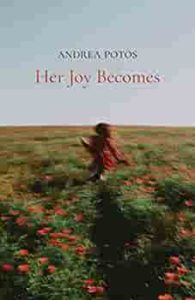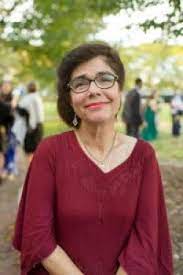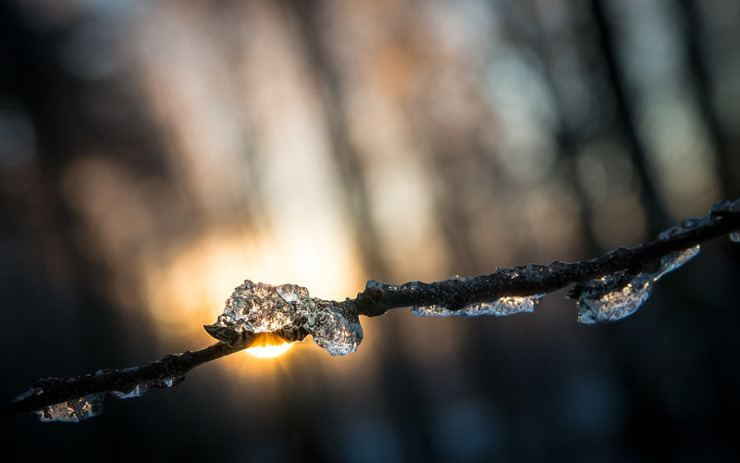Andrea Potos writes of relationships — and mothers
You reach an age when you discover that, no matter how hard you’ve tried not to, you’ve become more like your parents than you thought possible. And you wonder how that happens.
Poet Andrea Potos, in her new collection Her Joy Becomes, writes about her own mother — aging, becoming ill, not there any longer. The loss leaves a gap, until she catches herself doing the things her mother did, or is surprised by that familiar facial expression, or a memory surfaces. And she realizes that her mother hasn’t really left her after all.
Sometimes, I Notice

my mother—wearing a soft
plaid blouse she would wear,
my mouth turning its corners into a smile
at small delights:
relief of the heating pad
on my spasmed back muscle,
a plate of homemade ravioli
from my neighbor two doors down.
How to explain the wholeness
I inhabit, as if I have learned how to abide
with her lost physical form,
and she and I are together, both of us
giggling, a sound suddenly
like the tinkling of ice cubes
in the tall glass of soda she enjoyed each night.

Andrea Potos
Potos divides Her Joy Becomes into two groups of poems. The first is about her mother — sewing together (or trying to), her mother’s illness, childhood dreams, and life after loss. The second part, surprisingly, doesn’t seem to be about mothers or relationships, at least at first glance. But it is. She writes about reading someone’s childhood memoir, or basketball, or apple picking. And she’s writing about poets when she remembers her mother loved Wordsworth, or that the anniversary of her death has arrived (again). And then she remembers something else she misses about her.
These poems are an invitation of the most personal kind. They’re an invitation to step inside a person’s heart and mind, and to experience those memories with her. And the memories become very tangible, and you’re suddenly thinking of your own mother. If this is grief, it is grief of a very different kind, almost an appreciation of what someone like a parent has meant to you and done for you.
Potos is the author of 10 poetry collections. Her poems have been featured in a considerable number of print and online literary publications, and several of her books have received Outstanding Achievement Awards in Poetry from the Wisconsin Library Association. She’s also received the William Stafford Prize in Poetry from Rosebud Magazine and the James Heart Poetry Prize from the North American Review. She lives in Madison, Wisconsin.
Her Joy Becomes is a collection of quiet pictures, or slightly blurred photographs. And you’ll find yourself joining Potos and wandering around those pictures, touching a surface here or a kitchen counter there, and remembering.
Related:
Andrea Potos and Marrow of Summer
Photo by Mr. Moss, Creative Commons, via Flickr. Post by Glynn Young.
How to Read a Poem uses images like the mouse, the hive, the switch (from the Billy Collins poem)—to guide readers into new ways of understanding poems. Anthology included.
“I require all our incoming poetry students—in the MFA I direct—to buy and read this book.”
—Jeanetta Calhoun Mish
- Poets and Poems: Christina Cook and “Roaming the Labyrinth” - April 22, 2025
- Longfellow’s “Paul Revere’s Ride”: Creating a National Legend - April 17, 2025
- Poets and Poems: Katie Kalisz and “Flu Season” - April 15, 2025


Laura Lynn Brown says
Lovely post — I bet readers today will be thinking of specifics about their mothers, living or passed on (silk blouses with a safety pin to add an inch of decolletage modesty, Pepsi in the peacock cup with two ice cubes, the pop radio song she always sang along to).
The words “wholeness,” “habit” and “abide” stand out in that poem.
Glynn says
I think of my own mother – who loved making pies for holidays, learned to drive at age 32 (only because a certain child was getting ready to start kindergarten) and was forever terrified of driving on the interstate, and who at 82 rode out Hurricane Katrina with her 85-year-old sister. Those were the kinds of responses I started having reading this collection.
Megan Willome says
One of the things that still happens to me is I’ll see a family member I haven’t seen for a while, and they’ll do a double-take and call me Merry Nell.
Glynn says
Both my little brother and I were doppelgangers for my father.
Sandra Heska King says
This is timely. Remembering my mother who passed 11 years ago this month. When we were home for Thanksgiving, my brother gave me a stack of stuff my mom had saved–my baby footprint that I’d never seen, receipts from our wedding and reception, the dried corsage she wore, a telegram I’d sent from San Francisco to let them know we’d arrived safely, some notes I wrote… My kids roll their eyes at the stuff (I mean memories) that I’ve sorted and saved. But I guess I have my mother’s genes.
Glynn says
I have a large box of “your-kids-roll-their-eyes” stuff from my mother and my father. I’ve noticed that, as they’ve gotten older, they’ve gotten more interested.
Katie Spivey Brewster says
Such a poignant post, Glynn.
And these comments so evocative as well.
At my youngest sister’s house on Thanksgiving Day, I saw one of our mom’s plaid flannel shirts hanging on the back of a chair in her kitchen. After a gulp and pause, I smiled. How like my baby sis’ to choose that particular garment to remember her:) While we all helped care for my mother (she went Home in February) over the past several years, Missy was ever so attentive to her feeling warm as my mom being quite thin, chilled so easily.
As I type this it occurs to me that we each had some specific need of our mom’s that we zeroed in on and attended to in our own way – I think I feel a poem coming on;)
I SO appreciate you sharing Andrea Potos and Her Joy Becomes.
Gratefully,
Katie
Glynn says
Katie, thanks for the comment. Certain things, often unexpected, can trigger memories of my mother. This past summer, I tired a new flavor of store-bought yogurt (it was a seasonal flavor – lemon meringue). I tasted it, and suddenly I was sitting in the kitchen of my childhood home, waiting for my mother to cut a piece of her lemon icebox pie for me. That memory is more than 60 years old.